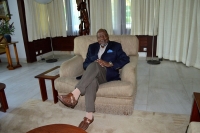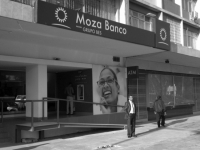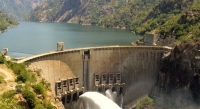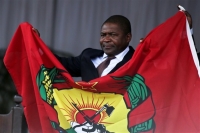Mozambique: Matola’s “business friendly attitude”
2013/05/17

Twenty years next the Rome Accords, Mozambique began with a deep process of peace building. Throughout these years, Mozambique has made an outstanding update of its economy to catch up with other African nations. But today, the country is growing in a different way and at a much faster speed than most neighbors. Where do you believe the economy is heading at the moment?
The great principle of development is a futuristic vision that is the keystone of sustainable development. Only with eyes put on the next, taking the present as a starting point and with references from the completed, will guide the country to the core of development.
The key element of development is the human resources potential: in Mozambique we are fortunate to have a potential human workforce. We as well have a wide range of features that open the doors for strong development. Agriculture is the engine, but we have to look at the energy resources as an extra lever that will allow the country to take strides in its development. It is in this context that we find areas of the country with potential industrial development, such as Matola.
Matola has a history of being the major holder of national industry. The reason is the prime location, in the midst of such a strategic region. And Matola is served by a strategic port, with fuel, coal, cereals and various cargo terminals. The Port of Matola – which allows a connection of major roads called Maputo Development Corridor – links Mozambique to South Africa and a lot of other nations such as Swaziland, Lesotho, Botswana, Zimbabwe, Namibia and even Angola.
Matola as well has strategic components of product flow. The southern African area contains about 300 million consumers, which makes this a potential market, for which Matola is the axis. This axis emphasises the industrial nature of Matola. This characteristic that some cities that do not have – the geographical configuration – is the one which allows the expansion and implantation of industries throughout the territory.
In these four years of my term, we opened three new areas of industrial development, the Matola Gare, where one of the major factories of southern Africa, the Coca-Cola Group, will be deployed, representing an investment of about USD 130 million. Around this territory, we will implement other SMEs from various segments of industrial activity, for example, building materials, chemical industry, metal-mechanics, etc. The Manatidzuana and Intaca areas will be the new industrial centres to be born in Matola.
One of the core components of our success is the set of actions we take to enhance the business potential of Matola by having a business friendly attitude. In the context of national wealth, we wouldn’t have been successful if we did not embrace the business sector; the existing entrepreneurs and those approaching, embracing a promotion line of investment , both domestic and foreign.
From 2009, we decided to perform the Matola Business Forum aimed at discussing local business opportunities, how to do business in Matola, which paths to follow with the authorities, etc. In Matola, we believe that the government and business corporate world should always work together, because together it is easy to understand each other. If the entrepreneur comprehends the government policies, he can easily fit into the business development model that the government envisions. The public-private partnerships should be in a context of values and principles in which both sectors should be guided; this partnership will not be in material terms but in conceptual, for the implementation philosophy.
Matola had a boom in business investment . Today we have accumulated investment of additional than USD 2 billion, but Matola is still a child; this price is good for us, it symbolises our increase.
The promotion that we do enables us to reach out as municipal government, because the entrepreneurs have a speed that must be followed. This factor is very good. Prime, because they will be able to reduce unemployment; most companies in the Matola area have locals as 60-80% of their workforce. Secondly, because it is an institution that generates incomes, which allows families to have decent livelihoods and an improved quality of life. And third, it will due or not instantly influence social structures.
In a recent study in the city of Santos, near São Paulo in Brazil, which has similar characteristics as the city of Matola, it was concluded that even if the private sector is very intensive – thanks to the port and the industrial sector – the government must not leave the social problems to be solved by market force only. The distribution of gain and most importantly, education to build local capacity was upmost significant for a city like Santos to develop a strong local human capital and not have to bring in people who had to travel each day to and from São Paulo. Can we say that the same story is replicated in Matola?
Yes, the prime business forum in 2009 and the prime agreement we signed with the municipal entrepreneurship was that the man-power had to be recruited locally; second, was on the participation of the business sector in Social Responsibility, a strong participation in the social development of Matola; third, as a result of this process, having higher education institutes and middle schools became a priority. We presently have middle schools from public government, the IFATA institute, the High Institute of Arts and Culture (ISARC), the Institute of Public Government (ISAP), etc. We are finalising discussions of foreign investment , for the construction of a Health School, which is an significant academic component for the city.
The business and industrial development are giving answers to match its interests; the human support of knowledge for development in the factory is the training that is by presently present in Matola. We no longer need to import a human resources manager, locksmith, IT, etc. because we formed them on this side.
Matola essentially emerged as an industrial hub; however, today it is as well emerging as a housing destination. Today is the second most populated city in Mozambique, next Maputo with nearly 1 million inhabitants and the trend is to grow even additional. But this increase has to do with the advantages that Matola can still give in terms of residential development; Matola is an open city and this is the Matola we are promoting.
Increase, particularly that related to industrial and housing expansion, always has an impact on the environment. Although the levels of CO2 emissions are at a very low level for Mozambique, even compared to other SADC nations, there needs to be a strategy to mitigate environmental externalities. How is the municipality tackling this issue?
Amount increase is a challenge and Matola is in ‘constant increase’ and as well has challenges of social order and social infrastructure: a new neighbourhood must have schools, hospitals, gas and water supply, adequate roads, etc.
With increase, as well come challenges of environmental order; any city like ours produces a lot of garbage, we cannot avoid it so we propose a new challenge: the treatment of garbage and solid waste. We encouraged a private enterprise interest to install a waste treatment plant and raw materials production for various purposes in Matola. We closed a transaction for the concerned company and provided 30 acres for the installation of this unit, which will as well make fertilisers, construction materials, etc. This is one way we found to reuse waste.
You claimed that you take care of promoting the image of Matola, at a national level to attract other companies, in the regional context in order to provide for the landlocked nations, and at a much wider international level to become a cluster of foreign companies. What are the tools that you use to promote the image of Matola?
Our view on the promotion of our image has to do with the initiatives that are created based on our needs and goals. We look into our local reality and produce initiatives that are intensely analysed to produce a good result. No investor would like to invest his money in vain; it has to be useful or to make additional money or goods, reassuring that the money is not wasted. Hence our message has to be clear.
We have to instil confidence that businesses will be supported and protected, nurture the investor with facilities, assistance and investment protection. We have to transmit this at the same time as we meet with entrepreneurs at conferences and forum, so they see us as facilitators and supporters.
These are significant tools at our disposal; the political will is critical in the diffusion of security that must be expressed together with the one who wants to earn additional money because, at the same time as one wins, the other as well wins. We have been able to create a platform for win-win situations.
We spoke with the governors of Tete, Sofala and Cabo Delgado, on essential infrastructure mega projects that will contribute significantly to the advancement of the economy and next development of society. What are the projects in Matola that will change the dynamics and give prominence to the municipality?
At the moment we are developing the Ring Road of Maputo that will surround Matola and connect it additional accessibly to the rest of the country and particularly to the Maputo Development Corridor. This road will be central to the products flow and traffic, which are an essential comparative chance of Matola.
A process of expansion and development is taking place in the Port of Matola; it is, an investment of about USD 870 million.
Until six months ago, Mozambique consumed domestic gas that was imported via trucks to the entire country, from South Africa, which conditioned the source of supply and didn’t create a diversity of competition. But today, a gas terminal has been by presently installed at the Port of Matola. We can presently open up for international competition and define our prices.
The industrial areas are located in different key points of Matola. The other very strong industry is the housing market development; there is a project to build 5,000 houses in Intaca that are by presently for sale.
These key projects will change completely the image of Matola. New industrial development hubs will emerge and thus improve roads. In a few weeks, I will receive the PCA of Coca-Cola, FIPAG and EDM to discuss the infrastructure improvements needed to increase access and supplies of their products to the factory, this will as well to serve the whole community and not only Coca-Cola.
We always had a vision based on next generations and only with this we will be capable of focusing sustainable development. The sustainability of investment , for me, rests on three grounds: correct environment, economic viability and social benefits. With these pillars we can have a solid strategy, and if we satisfy these three factors, we will proudly wave the flag of sustainable development.
History has shown an incredible resilience and a great ambition for increase in Matola. What is the political style that you follow which brought these results to the Municipality of Matola?
Politicians should be the instruments of communities: we have to live by the will of the people, whatever the political style is. It takes much management balance of the public and the private interests. Matola has about 900,000 inhabitants but there is only one president, I cannot be inert. I must be active and responsive, do and correct. This exercise requires sustainability, not just in the economic realm but in a political sense as well. These elements of good management are not learned in a university but in practical life, day-to-day as in a laboratory where in one day you can produce something that the next day won’t be useful. It is an ongoing exercise of innovation with a constant perspective of wanting to do the best for the people.
- Related Articles

safewater
2015/11/12 Gal Water Technologies Ltd. is backed by 20 years of experience in supplying water treatment systems for Industrial, Agricultural and Consumable water.
Mozambique’s ex-president Joaquim Chissano talks to PM Communications about the country’s major achievements
2015/09/18 Mozambique’s ex-president Joaquim Chissano talks to PM Communications about the country’s major achievements as it completes its 40th anniversary of independence. He takes the luck to criticize the attitude of Renamo – the major opposition party – as it threatens to return to war for not recognizing the victory of Frelimo in the last elections.
The Mozambique banking sector
2015/07/26 The Mozambique banking sector, which has high increase and good business prospects arising from foreign investment in exploration of natural resources, is attracting the attention of major international banks, according to Eaglestone Securities.
Mozambique is a target country in the internationalisation of China
2015/07/06 Mozambique is a target country in the internationalisation of China Three Gorges and China National Grid and two major hydroelectric projects that are being launched are of interest to these Chinese groups and their Portuguese subsidiaries. Paul Muxanga, chairman of the Cahora Bassa Hydroelectric Dam (HCB), said recently that the long-awaited construction of the northern plant of the Cahora Bassa hydroelectric facility should be initiated any minute at this time, a project which, according to the Portuguese financial daily Diário Económico, is “in the sights” of the two Chinese groups.
Mozambique's ambitious new executive
2015/06/24 Mozambique's ambitious new executive must find ways to bridge a set of gaps: between the core and the periphery; between political parties - established and new; and between the interests of business and the stark fact that Mozambique remains extremely poor, according to a new statement. Recent political developments in Mozambique mark the beginning of an significant era. The party of government, the Mozambique Liberation Front (FRELIMO), is clearly anxious to back the newly elected chief of national, Filipe Nyusi, who - following an initial tussle with his predecessor - is apparently keen to open a different style of dialogue with his rivals both part the country's opposition parties and within FRELIMO itself. This apparent political maturing comes at a time at the same time as the prospect of significant economic transition is gaining ground.
- Mozambique News
-
- DJIBOUTI CITY: East Africa moves to curb used car imports, boost local assembly plants
- CHINA: Support from China for the industrialisation of Angola and Mozambique
- MOZAMBIQUE: Mozambique seeks investors interested in graphite processing in Ancuabe
- MOZAMBIQUE: Mozambique government wants to increase financial inclusion of the population
- BOTSWANA: Routes Africa forum aims to improve African air connectivity
- BOTSWANA: Economic integration is helping boost trade and investment in Africa
- Trending Articles
-
- JAPAN: More of the same from Japanese polls next weekend
- PHILIPPINES: Will services continue to drive the Philippine economy?
- GERMANY: VW says US 'Dieselgate' settlement not to be replicated in Europe
- ISRAEL: Israel's tech boom under threat
- CONGO BRAZZAVILLE: Congo: Total abandons oil field citing decrease in global oil prices
- EUROPEAN UNION: EU meets without Britain for first time since Brexit vote




.gif?1356023993)






